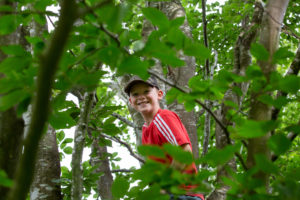My son’s experience of hemiplegic migraine
By: Niki Cormack, whose 11-year-old son lives with migraine
Our son was diagnosed with hemiplegic migraine at the age of seven after an attack that came somewhat out of the blue.
He had been out of sorts that morning, a bit clingy and unhappy and then started complaining about a pain in his arm. His symptoms escalated fairly quickly, his tongue became paralysed and the pain in his head was excruciating. He was very sick and the whole episode lasted about eight hours. It was a very scary experience for us all but we were very lucky in that we were able to see a doctor straight away and he was quite sure that it was a migraine.
Fairly soon after, our son was referred to a paediatric consultant who organised an MRI and he was put under the care of a neurologist. The MRI results were normal and he was prescribed some Sumatriptan.
The migraine attacks have gone from occurring 2-3 times a year, to now, at almost 12 years old, every couple of weeks. Over the last four years, he has tried four different preventive drugs, none of which have reduced the frequency or severity and have cause other unmanageable side effects such as low mood and depression, anxiety, and lethargy.
Migraine has a huge impact on his life. There is the constant worry about when the next migraine will happen and the attacks themselves are so severe – they are certainly not “just a headache” – numbness and paralysis of body parts, confusion and disorientation, hallucinations, unable to speak or find the right vocabulary, excruciating pain that lasts for hours, vomiting every 15 minutes for hours and he often ends up in hospital needing IV pain relief.
Watching your child suffer like this is unbearable, made worse knowing that there is nothing you can do to take the suffering away. The migraine ‘hangover’ stops him from doing normal things and the whole experience has a huge impact on his mental health.
“I always feel worried about getting a migraine. I used to only have them a few times a year but now it is a few times a month. The pain is so bad it feels like I am going to die and I think it will never go away. It is really scary especially when I can’t feel my legs and hands and I hate it when my mouth and tongue go all numb and I hate being so sick. I always feel like I have wasted the day when I’ve had a migraine which makes me feel really sad. I’d like to have more sleepovers but I’m scared to in case a migraine starts. I love camping but I always feel worried about going because when I have a migraine I scream in pain and I know it will wake everyone up. I don’t know what I have done to deserve getting migraines but I hope the doctors can invent some medication soon, that works.”

Our whole lives are affected by migraine.
Seeing what it does to our son is heart-breaking and his two sisters find it very upsetting and distressing. We have to take time off from work and I am at the point now where full-time employment is becoming difficult.
As parents, we worry about his education due to the amount of school he misses but also the long-term employment prospects. We have been very lucky that he has received a great deal of care and support from his primary school but we feel anxious about him starting secondary school – how he will cope and whether he will receive the same level of support and understanding from a much bigger school.
Considering that one in ten children suffer with migraine, in my opinion, there is a lack of empathy or real understanding about how horrific this condition is for children and their families. Almost five years on, he has only just been seen by a migraine specialist at Great Ormond Street. We feel frustrated that this referral wasn’t done years ago – if it is a condition too specialist for a paediatric consultant, why wasn’t he passed directly on to a specialist clinic a long time ago? Disappointingly, one of the last things his neurologist said to me before she retired was, “It is a condition that he is just going to have to learn to live with.” Maybe so, but we have to strive to explore all avenues in the plight to improve the quality of life for migraine sufferers.
Our son will shortly be trying his fifth preventative drug and we have been told that there are other triptans he can try. He will also be included on the paediatric drug trial for CGPR later this year and he will have some genetics testing done – so finally we feel like the condition is being taken seriously and we are making progress.
I think that it is hugely important that we raise the awareness of the condition so that GPs can refer children to the specialist clinics as soon as possible to have them assessed and put on the right treatment plan without any delays.
We are very grateful to Professor Peter Goadsby and colleagues at The Migraine Trust for all the ground-breaking work that has been done in this field and for the support they offer many families throughout the UK. It is reassuring to see how focused and determined they are to improve the lives of sufferers and they have given children a platform to have their voices heard.



